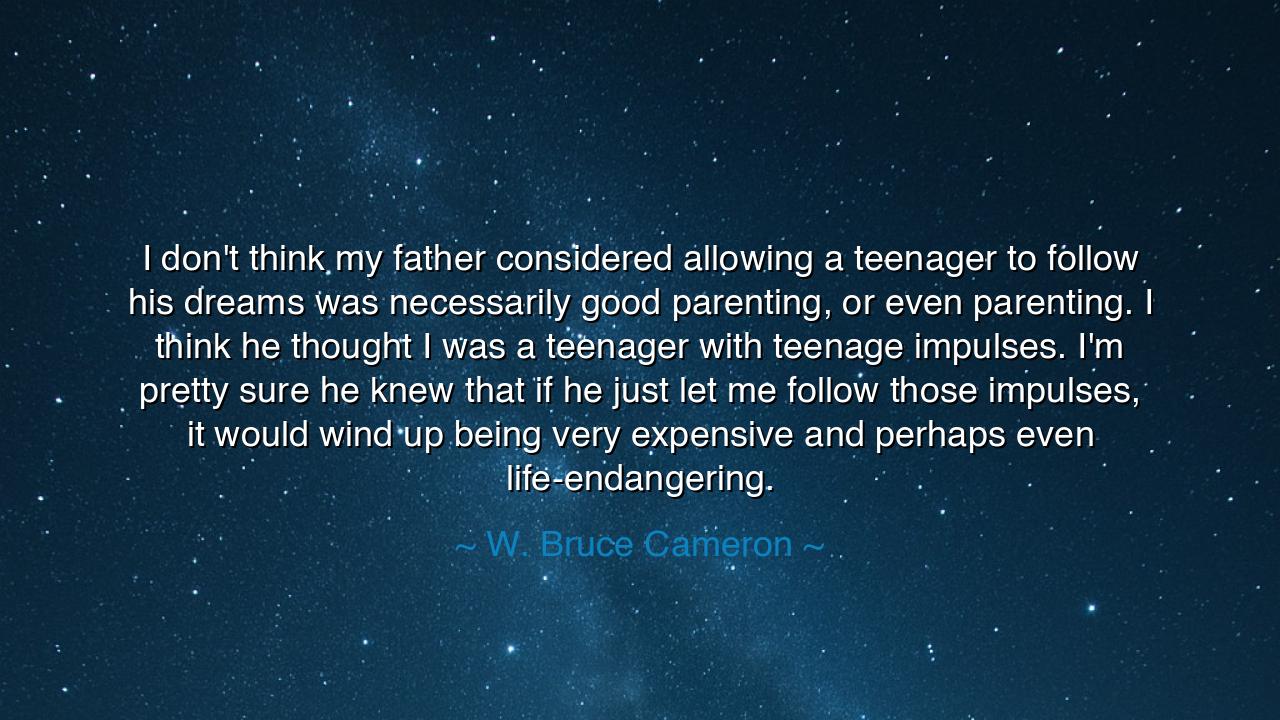
I don't think my father considered allowing a teenager to follow
I don't think my father considered allowing a teenager to follow his dreams was necessarily good parenting, or even parenting. I think he thought I was a teenager with teenage impulses. I'm pretty sure he knew that if he just let me follow those impulses, it would wind up being very expensive and perhaps even life-endangering.






The words of W. Bruce Cameron strike a deep chord in the ancient dialogue between youth and age: “I don't think my father considered allowing a teenager to follow his dreams was necessarily good parenting, or even parenting. I think he thought I was a teenager with teenage impulses. I'm pretty sure he knew that if he just let me follow those impulses, it would wind up being very expensive and perhaps even life-endangering.” These words carry the weight of memory, tempered by both love and wisdom. They remind us that the role of a father is not always to indulge, but often to restrain; not always to grant freedom, but sometimes to impose boundaries that guard against folly.
For in every age, the fire of youth has burned bright, reckless, and untamed. Teenagers, though filled with dreams and visions, are often carried by impulses that surge like spring floods—powerful, but unsteady, dangerous when unchecked. It is the parent who must act as the dam, the channel, guiding the waters so they do not sweep away the future in a flood of ruin. Cameron’s father knew that to allow every dream its flight was not nurture, but negligence. True parenting is not measured by how much freedom is given, but by how wisely love protects against destruction.
History offers us vivid testimony of this truth. Consider Alexander the Great, who as a youth longed for conquest even before he was ready to bear its weight. It was his tutor, Aristotle, and his father, Philip of Macedon, who sought to discipline his fiery spirit. They denied him indulgence in wild pursuits, shaping his mind before they allowed him to wield the sword. Without such guidance, Alexander’s impulses might have consumed him before he could rise to greatness. It was not by granting every desire, but by restraining them, that they gave the world one of history’s most formidable leaders.
Cameron’s words also shine a light on a common illusion of our age—that parenting must always nurture “dreams,” no matter how fleeting or fanciful. But the ancients knew dreams without discipline are like seeds cast upon stone: they may sprout, but they will never grow deep roots. A wise parent distinguishes between impulse and calling, between momentary desire and enduring purpose. To guard against the former is not cruelty, but mercy; to nurture the latter is the true art of guiding a child into adulthood.
There is pain in this restraint, both for parent and child. The child feels denied, imagining love withheld. The parent feels cruel, fearing the wrath of the young heart. Yet time, the great revealer, shows the wisdom of such limits. Many adults, like Cameron himself, look back and realize that the walls their parents set around them were not prisons, but fortresses—built to guard them until they could stand strong enough to face the world on their own.
The lesson for us is thus: do not confuse indulgence with love. Good parenting is not to grant every wish, but to discern which wishes are worthy, which must be tempered, and which must be refused. Parents must carry the burden of saying “no” when “yes” would lead to harm. And children, though they may not understand in youth, will one day see that boundaries were as much a gift as freedom.
Practically, this means parents should listen to the dreams of their children but weigh them with wisdom. Encourage passions, but guide them into safe and fruitful channels. Teach discipline alongside ambition, patience alongside vision. And when impulses surge toward folly, stand firm, even when misunderstood—for firmness is often the truest form of care.
Thus, let us remember Cameron’s reflection: the father’s wisdom lies not in yielding to the storm of teenage desire, but in holding steady the course of safety and growth. The fire of youth must be harnessed, not extinguished, so that in time it may become the steady flame of purpose. In this balance of love and restraint lies the essence of true parenting, a burden heavy to bear, yet sacred beyond all measure.






AAdministratorAdministrator
Welcome, honored guests. Please leave a comment, we will respond soon